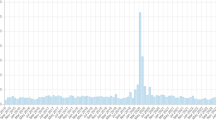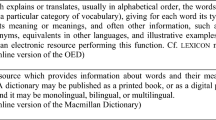Abstract
Noesis is an Internet search engine dedicated to mapping the profession of philosophy online. In this paper, I recount the history of the project’s development since 1998 and discuss the role it may play in representing philosophy optimally, adequately, fairly, and accessibly. Unlike many other representations of philosophy, Noesis is dynamic in the sense that it constantly changes and inclusive in the sense that it lets the profession speak for itself about what philosophy is, how it is practiced, and why it is important. In this paper, I explain how Noesis is dynamic and inclusive. I close by suggesting why such a communitarian representation of the profession is both timely and necessary.
Similar content being viewed by others
References
The papers below that discuss earlier versions of Noesis present some ideas that will never be developed. Over the past decade unanticipated changes in technology have somewhat resituated the project’s direction. The current paper represents our most recent vision along with a summary of highlights from the earlier versions.
Beavers, A. (1998a). Evaluating search engine models for scholarly purposes: A report from the internet applications laboratory. D-Lib Magazine: The Magazine of Digital Library Research, The Corporation for National Research Initiatives, December.
Beavers, A. (1998b). Noesis: Philosophical research on-line—An experiment in progress. Newsletter on Philosophy and Computers, American Philosophical Association, Vol. 98.2.
Buckner, C., Allen, C., & Niepert, M. (2010). From encyclopedia to ontology: Toward dynamic representation of the discipline of philosophy. Synthese (current volume).
Hölscher C., Strube G. (2000) Web search behavior of Internet experts and newbies. Computer Networks 33: 337–346
Jansen B., Spink A., Saracevic T. (2000) Real life, real users, and real needs: A study and analysis of user queries on the web. Information Processing & Management 36.2: 207–227
Leiter, B. (2009). The 2009 philosophical Gourmet report: Brian Leiter’s ranking of graduate programs in philosophy in the English-speaking world. Retrieved on March 31, 2009, from http://www.philosophicalgourmet.com/.
Linden, G., Jacobi, J., & Benson, E. (1998). Collaborative recommendations using item-to-item similarity mappings. Patent number 626649. Google Patent Search. Retrieved on March 31, 2009.
Morrow, D., & Sula, C. (2010). Naturalized metaphilosophy. Synthese (current volume).
Niepert, M., Buckner, C., & Allen, C. (2007). A dynamic ontology for a dynamic reference work. In E. M. Rasmussen, R. R. Larson, E. Toms, & S. Sugimoto (Eds.), Proceedings of the 7th ACM/IEEE-CS Joint Conference on Digital Libraries, June 18–23 (pp. 288–297). BC, Canada: Vancouver.
Shatz D. (2004) Peer review: A critical inquiry. Rowman & Littefield, Lanham, MD
Simon H. (1965) The shape of automation: For men and management. Harper & Row, New York
Spink A., Wolfram D., Jansen B., Saracevic T. (2000) Searching the web: The public and their queries. Journal of the American Society for Information Science and Technology 52.3: 226–234
Suber, P. (2002). Noesis: Is it a library with built-in searching or a search engine with a built-in library? Campus Technology.
The ISC Domain Survey. Internet Systems Consortium. Retrieved on March 31, 2009, from https://www.isc.org/solutions/survey.
Uzgalis, B. (2000). Searching phenomenology and cyberspace: An interview with Anthony Beavers. Newsletter on Philosophy and Computers. American Philosophical Association, Vol. 00.1.
Author information
Authors and Affiliations
Corresponding author
Rights and permissions
About this article
Cite this article
Beavers, A.F. Noesis and the encyclopedic internet vision. Synthese 182, 315–333 (2011). https://doi.org/10.1007/s11229-009-9663-0
Received:
Accepted:
Published:
Issue Date:
DOI: https://doi.org/10.1007/s11229-009-9663-0




